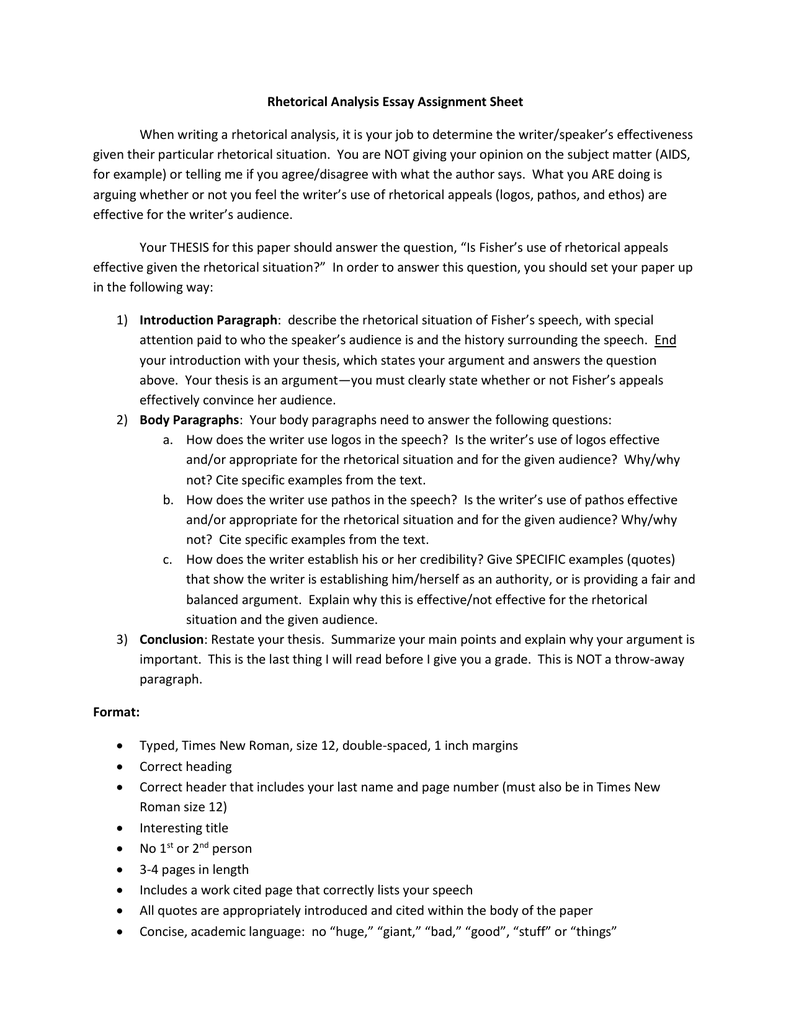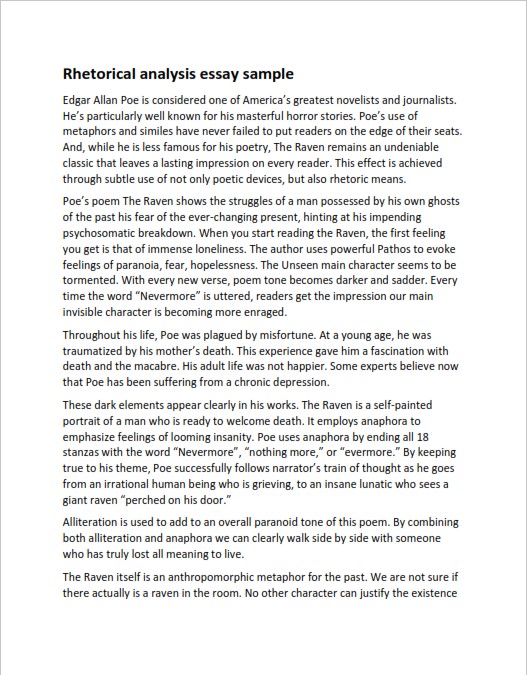
Introduction
As a rhetorical writer, you have to first analyze your text to get your persuasive art on point. Analyzing the text in detail involves asking appropriate questions to understand things like: The author’s purpose. The focus of the key claims. The tone of the text. Intended audience. Evidence presented. Context The structure of a rhetorical analysis essay is similar to that of an argumentative essay. It starts by making a bold claim to hook the readers and present the thesis statement in the introduction section. The main body discusses the text, and the conclusion chapter wraps it all up · Rhetoric, the art of effective speaking and writing, is a subject that trains you to look at texts, arguments and speeches in terms of how they are designed to persuade the audience. This section introduces a few of the key concepts of this field. Appeals: Logos, ethos, pathos Appeals are how the author convinces their blogger.coms: 2

How to Analyse the Text?
As a rhetorical writer, you have to first analyze your text to get your persuasive art on point. Analyzing the text in detail involves asking appropriate questions to understand things like: The author’s purpose. The focus of the key claims. The tone of the text. Intended audience. Evidence presented. Context The structure of a rhetorical analysis essay is similar to that of an argumentative essay. It starts by making a bold claim to hook the readers and present the thesis statement in the introduction section. The main body discusses the text, and the conclusion chapter wraps it all up · Rhetoric, the art of effective speaking and writing, is a subject that trains you to look at texts, arguments and speeches in terms of how they are designed to persuade the audience. This section introduces a few of the key concepts of this field. Appeals: Logos, ethos, pathos Appeals are how the author convinces their blogger.coms: 2

Key concepts in rhetoric
· Rhetoric, the art of effective speaking and writing, is a subject that trains you to look at texts, arguments and speeches in terms of how they are designed to persuade the audience. This section introduces a few of the key concepts of this field. Appeals: Logos, ethos, pathos Appeals are how the author convinces their blogger.coms: 2 As a rhetorical writer, you have to first analyze your text to get your persuasive art on point. Analyzing the text in detail involves asking appropriate questions to understand things like: The author’s purpose. The focus of the key claims. The tone of the text. Intended audience. Evidence presented. Context The structure of a rhetorical analysis essay is similar to that of an argumentative essay. It starts by making a bold claim to hook the readers and present the thesis statement in the introduction section. The main body discusses the text, and the conclusion chapter wraps it all up

essay guide
As a rhetorical writer, you have to first analyze your text to get your persuasive art on point. Analyzing the text in detail involves asking appropriate questions to understand things like: The author’s purpose. The focus of the key claims. The tone of the text. Intended audience. Evidence presented. Context The structure of a rhetorical analysis essay is similar to that of an argumentative essay. It starts by making a bold claim to hook the readers and present the thesis statement in the introduction section. The main body discusses the text, and the conclusion chapter wraps it all up · Rhetoric, the art of effective speaking and writing, is a subject that trains you to look at texts, arguments and speeches in terms of how they are designed to persuade the audience. This section introduces a few of the key concepts of this field. Appeals: Logos, ethos, pathos Appeals are how the author convinces their blogger.coms: 2

The Key Concepts of Rhetoric
· Rhetoric, the art of effective speaking and writing, is a subject that trains you to look at texts, arguments and speeches in terms of how they are designed to persuade the audience. This section introduces a few of the key concepts of this field. Appeals: Logos, ethos, pathos Appeals are how the author convinces their blogger.coms: 2 As a rhetorical writer, you have to first analyze your text to get your persuasive art on point. Analyzing the text in detail involves asking appropriate questions to understand things like: The author’s purpose. The focus of the key claims. The tone of the text. Intended audience. Evidence presented. Context The structure of a rhetorical analysis essay is similar to that of an argumentative essay. It starts by making a bold claim to hook the readers and present the thesis statement in the introduction section. The main body discusses the text, and the conclusion chapter wraps it all up
No comments:
Post a Comment